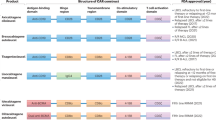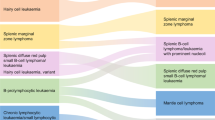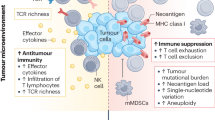Abstract
Patients who undergo autologous peripheral blood stem cell (PBSC) transplantation experience multiple symptoms that adversely affect quality of life. We assessed symptoms during the acute phase of autologous PBSC transplantation to determine the severity of individual symptoms and to determine overall symptom profiles in 100 patients with multiple myeloma or non-Hodgkin's lymphoma. Study subjects completed the blood and marrow transplantation module of the M. D. Anderson Symptom Inventory before hospitalization, during conditioning, on day of transplantation, at nadir (the time of lowest white blood cell count) and on day 30 post-transplantation. Additional symptom, quality-of-life and medical status measures were collected. Symptom means were mild at baseline, intensified during conditioning, peaked at nadir and decreased by day 30. At nadir, the most severe symptoms for the entire patient sample were lack of appetite, fatigue, weakness, feeling sick, disturbed sleep, nausea and diarrhea. Cancer diagnosis was a significant predictor of changes in symptoms over time. The patterns of fatigue, pain, sleep disturbance and lack of appetite were significantly different for patients with multiple myeloma as compared with patients with non-Hodgkin's lymphoma.
This is a preview of subscription content, access via your institution
Access options
Subscribe to this journal
Receive 12 print issues and online access
$259.00 per year
only $21.58 per issue
Buy this article
- Purchase on Springer Link
- Instant access to full article PDF
Prices may be subject to local taxes which are calculated during checkout




Similar content being viewed by others
References
Andrykowski MA . Psychosocial factors in bone marrow transplantation: a review and recommendations for research. Bone Marrow Transplant 1994; 13: 357–375.
Hjermstad MJ, Kaasa S . Quality of life in adult cancer patients treated with bone marrow transplantation--a review of the literature. Eur J Cancer 1995; 31A: 163–173.
Neitzert CS, Ritvo P, Dancey J, Weiser K, Murray C, Avery J . The psychosocial impact of bone marrow transplantation: a review of the literature. Bone Marrow Transplant 1998; 22: 409–422.
Whedon M, Ferrell BR . Quality of life in adult bone marrow transplant patients: beyond the first year. Semin Oncol Nurs 1994; 10: 42–57.
Hacker ED . Quantitative measurement of quality of life in adult patients undergoing bone marrow transplant or peripheral blood stem cell transplant: a decade in review. Oncol Nurs Forum 2003; 30: 613–629.
Fife BL, Huster GA, Cornetta KG, Kennedy VN, Akard LP, Broun ER . Longitudinal study of adaptation to the stress of bone marrow transplantation. J Clin Oncol 2000; 18: 1539–1549.
Gaston-Johansson F, Fall-Dickson JM, Bakos AB, Kennedy MJ . Fatigue, pain, and depression in pre-autotransplant breast cancer patients. Cancer Pract 1999; 7: 240–247.
Gaston-Johansson F, Ohly KV, Fall-Dickson JM, Nanda JP, Kennedy MJ . Pain, psychological distress, health status, and coping in patients with breast cancer scheduled for autotransplantation. Oncol Nurs Forum 1999; 26: 1337–1345.
Larsen J, Nordstrom G, Bjorkstrand B, Ljungman P, Gardulf A . Symptom distress, functional status and health-related quality of life before high-dose chemotherapy with stem-cell transplantation. Eur J Cancer Care (Engl) 2003; 12: 71–80.
Lee SJ, Loberiza FR, Antin JH, Kirkpatrick T, Prokop L, Alyea EP et al. Routine screening for psychosocial distress following hematopoietic stem cell transplantation. Bone Marrow Transplant 2005; 35: 77–83.
Sherman AC, Simonton S, Latif U, Spohn R, Tricot G . Psychosocial adjustment and quality of life among multiple myeloma patients undergoing evaluation for autologous stem cell transplantation. Bone Marrow Transplant 2004; 33: 955–962.
McQuellon RP, Russell GB, Cella DF, Craven BL, Brady M, Bonomi A et al. Quality of life measurement in bone marrow transplantation: development of the Functional Assessment of Cancer Therapy-Bone Marrow Transplant (FACT-BMT) scale. Bone Marrow Transplant 1997; 19: 357–368.
Gaston-Johansson F, Franco T, Zimmerman L . Pain and psychological distress in patients undergoing autologous bone marrow transplantation. Oncol Nurs Forum 1992; 19: 41–48.
Gaston-Johansson F, Foxall M . Psychological correlates of quality of life across the autologous bone marrow transplant experience. Cancer Nurs 1996; 19: 170–176.
Syrjala KL, Chapko ME . Evidence for a biopsychosocial model of cancer treatment-related pain. Pain 1995; 61: 69–79.
Prieto JM, Atala J, Blanch J, Carreras E, Rovira M, Cirera E et al. Patient-rated emotional and physical functioning among hematologic cancer patients during hospitalization for stem-cell transplantation. Bone Marrow Transplant 2005; 35: 307–314.
El-Banna MM, Berger AM, Farr L, Foxall MJ, Friesth B, Schreiner E . Fatigue and depression in patients with lymphoma undergoing autologous peripheral blood stem cell transplantation. Oncol Nurs Forum 2004; 31: 937–944.
Larson PJ . Perceptions of the needs of hospitalized patients undergoing bone marrow transplant. Cancer Pract 1995; 3: 173–179.
Lawrence CC, Gilbert CJ, Peters WP . Evaluation of symptom distress in a bone marrow transplant outpatient environment. Ann Pharmacother 1996; 30: 941–945.
McGuire DB, Altomonte V, Peterson DE, Wingard JR, Jones RJ, Grochow LB . Patterns of mucositis and pain in patients receiving preparative chemotherapy and bone marrow transplantation. Oncol Nurs Forum 1993; 20: 1493–1502.
Molassiotis A, Van Den Akker OB, Milligan DW, Goldman JM . Symptom distress, coping style and biological variables as predictors of survival after bone marrow transplantation. J Psychosom Res 1997; 42: 275–285.
Schulmeister L, Quiett K, Mayer K . Quality of life, quality of care, and patient satisfaction: perceptions of patients undergoing outpatient autologous stem cell transplantation. Oncol Nurs Forum 2005; 32: 57–67.
Schulz-Kindermann F, Hennings U, Ramm G, Zander AR, Hasenbring M . The role of biomedical and psychosocial factors for the prediction of pain and distress in patients undergoing high-dose therapy and BMT/PBSCT. Bone Marrow Transplant 2002; 29: 341–351.
Hann DM, Garovoy N, Finkelstein B, Jacobsen PB, Azzarello LM, Fields KK . Fatigue and quality of life in breast cancer patients undergoing autologous stem cell transplantation: a longitudinal comparative study. J Pain Symptom Manage 1999; 17: 311–319.
Anderson KO, Syrjala KL, Cleeland CS . How to assess cancer pain. In: Turk DC, Melzack R (eds). Handbook of Pain Assessment, 2nd edn. Guilford Press: New York, 2001, pp 579–600.
von Roenn JH, Cleeland CS, Gonin R, Hatfield AK, Pandya KJ . Physician attitudes and practice in cancer pain management: a survey from the Eastern Cooperative Oncology Group. Ann Intern Med 1993; 119: 121–126.
Cleeland CS, Reyes-Gibby CC . When is it justified to treat symptoms? Measuring symptom burden. Oncology (Huntingt) 2002; 16: 64–70.
Cleeland CS, Mendoza TR, Wang XS, Chou C, Harle MT, Morrissey M et al. Assessing symptom distress in cancer patients: the M. D. Anderson Symptom Inventory. Cancer 2000; 89: 1634–1646.
Anderson KO, Giralt SA, Neumann JL, Warneke CL, Mendoza TR, Brown JO et al. Symptom Assessment Following Autologous Transplantation: Relation of Symptom Severity to Laboratory Measures. American Society of Hematology 45th Annual Meeting: San Diego, CA, 2003.
McNair DM, Lorr M, Droppleman LF . Manual for the Profile of Mood States. Educational and Industrial Testing Service: San Diego, CA, 1992.
McNair DM, Lorr M, Droppleman LF . Educational and Industrial Testing Service. Profile of Mood States. Educational and Industrial Testing Service: San Diego, CA, 1971.
Fawzy FI, Cousins N, Fawzy NW, Kemeny ME, Elashoff R, Morton D . A structured psychiatric intervention for cancer patients, I: changes over time in methods of coping and affective disturbance. Arch Gen Psychiatry 1990; 47: 720–725.
Spiegel D, Bloom JR . Group therapy and hypnosis reduce metastatic breast carcinoma pain. Psychosom Med 1983; 45: 333–339.
Cella DF, Tulsky DS, Gray G, Sarafian B, Linn E, Bonomi A et al. The Functional Assessment of Cancer Therapy scale: development and validation of the general measure. J Clin Oncol 1993; 11: 570–579.
Oken MM, Creech RH, Tormey DC, Horton J, Davis TE, McFadden ET et al. Toxicity and response criteria of the Eastern Cooperative Oncology Group. Am J Clin Oncol 1982; 5: 649–655.
Cleeland CS, Gonin R, Hatfield AK, Edmonson JH, Blum RH, Stewart JA et al. Pain and its treatment in outpatients with metastatic cancer. N Engl J Med 1994; 330: 592–596.
Cleeland CS, Gonin R, Baez L, Loehrer P, Pandya KJ . Pain and treatment of pain in minority patients with cancer. The Eastern Cooperative Oncology Group Minority Outpatient Pain Study. Ann Intern Med 1997; 127: 813–816.
Serlin RC, Mendoza TR, Nakamura Y, Edwards KR, Cleeland CS . When is cancer pain mild, moderate or severe? Grading pain severity by its interference with function. Pain 1995; 61: 277–284.
Mendoza TR, Wang XS, Cleeland CS, Morrissey M, Johnson BA, Wendt JK et al. The rapid assessment of fatigue severity in cancer patients: use of the Brief Fatigue Inventory. Cancer 1999; 85: 1186–1196.
Acknowledgements
This research was supported by Public Health Service grant CA85228 from the National Cancer Institute. We gratefully acknowledge the recruiting assistance of Smiler Smith and Leah Beattie-Palmer. We also acknowledge the editorial assistance of Jeanie Woodruff, ELS.
Author information
Authors and Affiliations
Corresponding author
Rights and permissions
About this article
Cite this article
Anderson, K., Giralt, S., Mendoza, T. et al. Symptom burden in patients undergoing autologous stem-cell transplantation. Bone Marrow Transplant 39, 759–766 (2007). https://doi.org/10.1038/sj.bmt.1705664
Received:
Revised:
Accepted:
Published:
Issue Date:
DOI: https://doi.org/10.1038/sj.bmt.1705664
Keywords
This article is cited by
-
Quality of life and symptom burden in hematological cancer patients receiving hematopoietic stem cell transplantation: an observational study at Regional Cancer Centre, India
Supportive Care in Cancer (2024)
-
A Self-Help Manual for Psychological Distress and Quality of Life During a Haemopoietic Stem-Cell Transplant: An Effectiveness and Acceptability Pilot
Journal of Clinical Psychology in Medical Settings (2023)
-
Fatigue among post–hematopoietic stem cell transplant patients in Jordan: prevalence and associated factors
Supportive Care in Cancer (2022)
-
Efficacy of expressive helping in adult hematologic cancer patients undergoing stem cell transplant: protocol for the Writing for Insight, Strength, and Ease (WISE) study’s two-arm randomized controlled trial
Trials (2021)
-
Palliative care for patients undergoing stem cell transplant: intervention components and supportive care measures
Bone Marrow Transplantation (2021)



